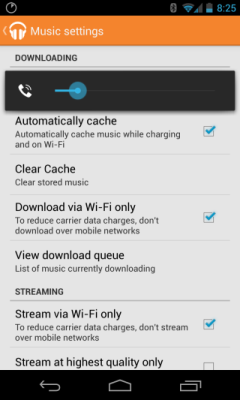
Just as Microsoft focuses its music service to its own platforms, Google Play All Access only supports Android in the mobile world. Its web-based interface works across desktop platforms as well as Windows RT, however. The lack of an iOS app is a big limitation for me. It would be nice to be able to stream music to an iPhone or iPad. And, the web interface for the desktop needs a bit of work in its navigation interface.
If, however, you have an Android device, update the Play Music app to be able to stream from the All Access service. Google provides a free 30-day trial. And, if you start the trial and opt to pay for the service before June 30, 2013, the monthly recurring fee will be $7.99 instead of the regular $9.99. There is no indication how long this reduced price will be in effect.
The Android Play Music app provides a sparse but usable interface. Its Explore option will show you recommended, featured, and new music lists. You can also explore by music genres. I didn’t find this feature particularly useful. And, it seemed especially weak in the world music category. But, it might just be a learning curve issue. One thing to pay attention to is the apps settings. I recommend limiting it to WiFi-only (see screenshot) until you learn more about how the app operates. I found, for example, that it downloaded over 250MB of data while testing it. One factor is the “Add to Library” downloads, for example, an entire album. Just remember that a “library” is different from a “playlist.”
My initial opinion is that Spotify’s Windows software (I haven’t tried the Mac OS X version) is easier to than Google Music’s web interface. Spotify’s UI makes it easier to search for music, discover related music, create playlists, and, in general, simply play music.
In a post-June 30 world where both Spotify and Google Play All Access will cost $9.99 per month, I think Spotify’s support for iOS devices and better desktop interface wins. Oh, and one more thing… Google Play All Access only lets you share music on Google+. If your friends are on Facebook (along with hundreds of millions of other people), that is just too bad. Google’s current social strategy feels very 1990s AOL walled garden-like to me.